MusicRadar Verdict
Some small issues can't detract too much from this superbly-made instrument.
Pros
- +
Solid build; manageable weight; sounds; affordable price.
Cons
- -
Scratchy frets; bridge pickup adjustment issue.
MusicRadar's got your back

Cort Source BV-CR

Cort Source BV-CR

Cort Source BV-CR
Cort has been a very big name in guitar manufacturing for many years, supplying instruments under contract to a wide range of brands.
Since 1982, the company has also been producing guitars under its own name, quickly establishing a reputation for quality and value for money among those in the know. When Hugh Manson was looking for a factory to build the award-winning MBC-1 Matthew Bellamy Signature, that's exactly where he went.
Our review instrument forms part of Cort's Chinese-made Hollow Body series. The Bigsby vibrato has always been a popular choice for this type of guitar, but seems particularly in vogue at the moment. The 'B60' licensed version used here gives a classic look and performance we'd expect. The medium/slim maple 'C' shape neck is glued in at the body end with a dovetail joint.
Looking up towards the headstock, the popular and durable scarf joint construction is just visible through the semi-translucent finish behind the 2nd/3rd frets. Speaking of frets, these are of the medium (as opposed to jumbo) variety, 22 of them set into a dark rosewood 'board, with a 629mm (24.75-inch) scale length.
This classic influence also extends to the finish. The Cherry Red Source calls to mind one of the more popular finishes offered on the legendary Gibson ES-335, set off beautifully by the off-white binding on both body and neck. Even the closest examination doesn't reveal a single flaw - including inside the f holes, which is a common issue on many guitars like this. While these finishes may not be vintage-correct nitrocellulose, they are beautifully and sparingly applied.
Feel & Sounds
Picking up the Source, we're immediately taken with the balance and light weight - something that is often compromised with the addition of a substantial Bigsby. Also impressive are the comfortable neck profile and easy upper fret access - this must have been a revelation when the ES-335 first appeared in 1958.
Picking up the Source, we're taken with the balance and light weight - something often compromised with the addition of a substantial Bigsby.
The two Classic Rocker Alnico II single coils live up to their name, giving this guitar a powerful, authoritative voice with plenty of body and cut: the middle position is perfect for clean 50s-style rock 'n' roll licks, while there is plenty of power available to drive an amp hard. It certainly liked our Blues DeVille, responding well on the volume and tone controls to give everything from a fat Tele-style twang to plump jazz chords and brash rock rhythm.
Want all the hottest music and gear news, reviews, deals, features and more, direct to your inbox? Sign up here.
Though part of the Hollow Body series, this guitar features a ES-335-style solid centre block, which certainly helps keep resonant feedback at bay at higher volumes, along with the laminated maple body construction, but in use like this, we have two minor gripes. First, the bridge pickup is set quite low and could really do with some longer screws to allow it to be adjusted closer to the strings.
Also, the frets, while well fitted and dressed, could have done with an extra polish - they feel ever so slightly abrasive under string bends and with vibrato. This is a cheap and easy fix, of course, but one that probably should have been taken care of before the guitars left the factory. On the positive side, the setup is otherwise very good: no rattles, buzzes or fretting out on the comfortable 305mm (12-inch) radius 'board.
The vintage-style plastic tulip button tuners and well-cut nut aids very stable tuning, even when getting a little carried away with the Bigsby. Overall, this is a quality and typically versatile instrument with a convincing palette of tones on offer to suit jazz, blues, country and harder rock.
Minor setup quibbles aside, this guitar is beautifully made and come in at a very competitive price with a gigbag to boot.